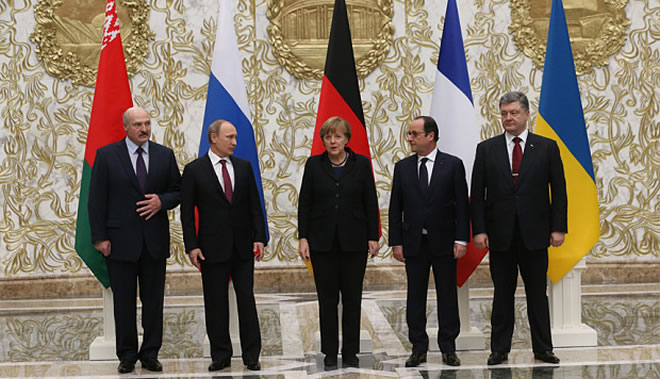
Thursday, February 12, 2015

Famous five: Lukashenko, Putin, Merkel, Hollande and Poroshenko in Minsk
Russian President Vladimir Putin announced a cease-fire agreement for eastern Ukraine had been reached Thursday, bringing an end to marathon talks between the leaders of Ukraine, Russia, Germany and France.
The agreement is due to take effect at midnight Sunday (4 p.m. ET Saturday), but questions remain about whether the deal will hold up after the collapse of a previous cease-fire in September. French President Francois Hollande called the agreement a "serious deal" in comments to the BBC, but noted that not every issue had been resolved. Hollande said that he and German Chancellor Angela Merkel were committed to helping verify the cease-fire process.
In one potential area of disagreement, Putin said that he and his opposite number, Ukraine's Petro Poroshenko disagreed on assessing the situation in the government-held town of Debaltseve. The town is a key transport hub between Donetsk and Luhansk, the two major cities controlled by Moscow-backed separatist rebels, and has been the focus of intense fighting in recent weeks as the rebels sought to encircle the Ukrainian troops there.
Putin said that the rebels consider the Ukrainian forces surrounded and expect them to surrender, while Ukraine disagrees with that. Putin added that they agreed with Poroshenko to clarify the situation, and urged the warring parties to show restraint.
For his part, Poroshenko said that all parties agreed to help Ukraine reclaim control of the border with Russia, some of which is now controlled by the rebels. Poroshenko also told reporters that that heavy weaponry will be withdrawn from the front lines by both sides between 31 and 43 miles in the next two weeks.
The line of division and other key provisions were contained in a document endorsed by rebel chiefs and the representatives of Russia, Ukraine and the Organization for Security and Cooperation in Europe (OSCE). That agreement was endorsed by the four leaders, who issued a separate declaration.
Poroshenko also said that no agreement had been reached on the issue of greater autonomy for the rebel-held areas of eastern Ukraine. The separatists' early demands for a federalized Ukraine culminated in a May independence referendum.
"We were presented with various unacceptable conditions of withdrawal and surrender," Poroshenko said. "We did not agree to any ultimatums and stated firmly that the cease-fire that is announced is unconditional."
Poroshenko also said the documents signed envisage the withdrawal of all foreign troops and militants from Ukraine -- a reference to the soldiers and weapons that Ukraine and the West say Russia has sent into eastern Ukraine to back the rebels. Moscow has denied the accusations, saying Russians in eastern Ukraine were volunteers, but the sheer number of sophisticated heavy weapons in rebels' possession belies the denial.
The talks in the Belarusian capital, Minsk, had lasted for 16 hours before the cease-fire was announced.
"It was not the best night in my life," Putin told reporters, "but the morning, I think, it is good because we have managed to agree on the main things despite all the difficulties of the negotiations."
"We came to an agreement, an agreement on a cease-fire and on a global political settlement of the Ukrainian conflict," Hollande said. "That global settlement will include all issues, from the cease-fire to the control of the border, to decentralization, and, of course, the pullback of heavy weapons and resuming economic relations."
Hollande also praised Putin for applying "pressure as much as necessary on the separatists."
Meanwhile, both sides reported fighting across eastern Ukraine Thursday, as the conflict the U.N. says has killed over 5,300 people since this past April ground on.
The talks had been given added urgency by an increase in bloodshed in recent weeks, as well as rising calls by U.S. lawmakers to provide Kiev's forces with so-called lethal aid. European leaders, led by Merkel, fear that increased weapons shipments would only aggravate the fight. Russia, meanwhile, faces a severe economic downturn driven in part by sanctions the West has imposed for supporting the separatists with troops and equipment, which Russia vehemently denies it is doing.
Merkel, Putin, Poroshenko and Hollande first sat down with each other Wednesday evening as crowds of reporters waited anxiously in a marble-floored, chandeliered convention hall.
Before heading to Minsk, Russia Foreign Minister Sergey Lavrov said the most important goal of the talks would be to implement a cease-fire, but warned that Ukraine could fully re-establish its control over the border with Russia only if it offers a degree of autonomy to the east and lifts its economic blockade.
"To give away the Russian part of the border also would be to cut them (the rebels) off even from humanitarian help and allow them to be surrounded," Lavrov said.
Meanwhile, in Donetsk, rebel officials said five people were killed and nine wounded in a shelling attack on a bus station on Wednesday. Officials in Kiev said 19 troops were also killed in fighting in Debaltseve, a hotly contested transport hub in eastern Ukraine.
Poroshenko posted a statement saying he had made an impromptu visit early Wednesday to the eastern Ukrainian city of Kramatorsk, where Kiev says 16 people were killed and 48 wounded in a rocket strike a day earlier. The city is 30 miles from the nearest front line.